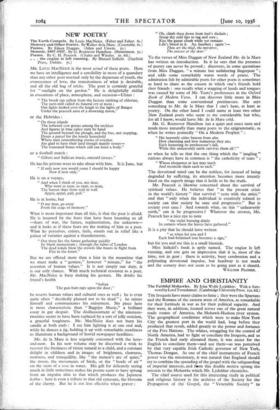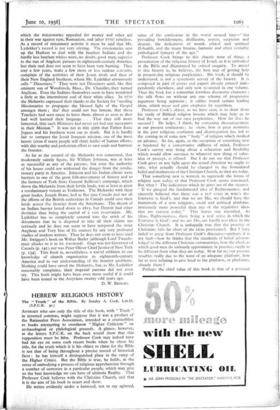EMPIRE AND CHRISTIANITY
The Faithful Mohawks. By John Wolfe Lydekker. With a fore- word by Lord Tweedsmuir. (Cambridge UniversityPress. 12s. 6d.)
THE Iroquois have many claims to fame ; they were the Spartans and the. Romans of the eastern areas of America, as remarkable for their fortitude in war as for their political sagacity. And they were, in addition, located across one of the great natural trade routes of America, the Mohawk-Hudson river system. The geographical conditions which were to make New York City the greatest port in the world had, long before they produced that result, added greatly to the power and fortunes of the Five Nations. The whites, struggling for the control of North America, had to fight or conciliate the Iroquois, and as the French had early alienated them, it was easier for the English to conciliate them—and use them—as was perceived by that very capable Irish Catholic governor of New York, Thomas Dongan. As one of the chief instruments of French power was the missionary, it was natural that England should try to combine the spreading of the gospel with the safeguarding of imperial interests, and from this double motive sprang the mission to the Mohawks which Mr. Lydekker chronicles.
The chief source used for this interesting study in political and religious history is the archives of the Society for the Propagation of the Gospel, the - " Venerable Society" to which the missionaries appealed for money and other aid in their war against rum, Romanism, and (after 1770) rebellion. As a record of missionary activity it must be said that Mr. Lydekker's record is not very stirring. The missionaries sent up the Hudson to deal with the heathen Indians and the hardly less heathen whites were, no doubt, good men, superior to the run of Anglican parsons in eighteenth-century America, but their zeal does not seem to have been very burning. They stay a few years, make a few more or less zealous converts, complain of the activities of their Jesuit rivals and then of their New England brethren, whom Mr. Lydekker erroneously calls " Dissenters." They were not Dissenters until, like that eminent son of Woodstock, Mass., Dr. Chandler, they turned Anglican. Even the Indians themselves seem to have wondered a little at the intermittent zeal of their white allies. In 1770 the Mohawks expressed their thanks to the Society for "sending Missionaries to propagate the blessed light of the Gospel amongst them ; tho' they could not but lament, that these Teachers had seen cause to leave them, almost as soon as they had well learned their language . . . That they still more lamented, that such Ministers had never yet had any successors in their Mission." It was not in this spirit that Father Isaac Jogues and his brethren went out to death. But it is hardly fair to compare the Jesuit Iroquois mission, one of the most heroic (even if many people will think futile) of human efforts, with this worthy and pedestrian effort to save souls and buttress the frontier.
As far as the control of the Mohawks was concerned, that moderately saintly figure, Sir William Johnson, was at least as successful as any of the parsons, but even the authority of his house could not withstand the danger from the revolu- tionary party in America. Johnson and his Indian clients were barriers to one of the great folk-movements of history and to the farmers of York State General Sullivan's campaign, which drove the Mohawks from their fertile lands, was at least as great a revolutionary victory as Yorktown. The Mohawks with their great leader, Joseph Brant, had to flee into Canada and not all the efforts of the British authorities in Canada could save their lands across the frontier from the Americans. The dream of an Indian barrier lasted down to 1815, but Detroit had other destinies than being the capital of a vast reservation. Mr. Lydekker has so completely entered into the spirit of his documents that he is disposed to take all their claims too seriously and he does not seem to have tempered the stout Anglican and Tory bias of his sources by any very profound studies of modern writers. Thus he does not seem to have used Mr. Swiggett's book on Walter Butler (although Lord Tweeds- muir alludes to it in his foreword). Gage was not Governor of Canada (p. 141), nor was Peter Oliver Chief Justice of New York (p. 134). This book is, nevertheless, a useful addition to our knowledge of church organisation in eighteenth-century America and to our understanding of the frontier problems. Nothing could have saved the Mohawks, but, as Mr. Lydekker reasonably complains, their imperial patrons did not even try. This book might have been even more useful if it could have been issued to the Assyrians twenty odd years ago.
D. W. BROGAN.











































 Previous page
Previous page